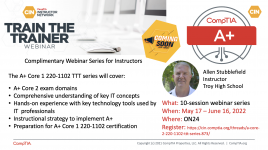now exam is 3year renewals by test
- By dwightwatt
- Certifications
- 3 Replies
Until recently if you renewed a CompTIA certification by taking an exam your certification was not renewed by 3 years from expire date but date you took test on. If used CEUs and renewed early it renewed from expire date.
When I just passed Security+ and it renewed network+ and security+ for 3 years from expire date. So mine expire in 2027. I am glad they do this.
I agree with following but caveat for you. If you do then have a long expire date, nothing counts for renewal on that new cert date until you get in 3 year window to expire date.
When I just passed Security+ and it renewed network+ and security+ for 3 years from expire date. So mine expire in 2027. I am glad they do this.
I agree with following but caveat for you. If you do then have a long expire date, nothing counts for renewal on that new cert date until you get in 3 year window to expire date.


